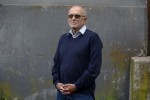Despite much contention the New South Wales Police Force joined the Sydney Gay and Lesbian Mardi Gras Parade on March 2.
The Mardi Gras Board initially asked NSW Police not to march, after senior constable Beau Lamarre-Condon allegedly shot Jesse Baird and Luke Davies with his police-issued gun on February 19.
See also
NSW gay hate report recommends new inquests, police education Minns waters down conversion therapy ban after pressure from faith council Protests demand UNRWA funding restored as Israel starves Palestinians A photograph of Lamarra-Condon marching in uniform at the 2020 parade quickly went viral.
However, the Mardi Gras board bowed to pressure from police minister Yasmin Catley, NSW Premier Chris Minns, Sydney MLA Alex Greenwhich and Prime Minister Anthony Albanese, among others, and allowed the police to march in plain clothes.
Police ended up marching in matching navy blue shirts, flanked on either side by uniformed riot squad officers.
Why did so many politicians call for the NSW Police Force, an organisation with a long history of homophobia, to be allowed to march?
It is because allowing officers to march in an LGBTIQ event provided the police with a legitimacy that had been eroded by the alleged killing of two gay men by a senior officer.
NSW Police Commissioner Karen Webb said she was “delighted” with the reversal.
When criticised for being slow to address the community following the murders Webb responded: “There will always be haters. Haters like to hate. Isn’t that what Taylor [Swift] says?”
Grassroots LGBTIQ rights group Pride in Protest (PiP) has been campaigning for police to be blocked from marching in the Mardi Gras parade since 2018, because of the force's brutality towards queer people, First Nations people and other minorities.
Many have pointed out that the first Mardi Gras in 1978 was a protest against police violence towards the LGBTIQ community.
The Mardi Gras Board had resisted these calls since police first joined the parade in 1998, but the recent murders were the final straw. The board requested that police refrain from marching to give the community “space to grieve”.
PiP spokesperson Charlie Murphy said “NSW police are complicit in the deaths” of Baird and Davies. She pointed out that Lamarre-Condon allegedly used his police-issued handgun to commit the murders.
Murphy further said that Baird had raised safety concerns with the police, but they were not acted upon.
Minns and Webb's reaction amounted to a shrug, asking: “What’s all the fuss about?”.
Pressure from the government — which provides significant funding for Mardi Gras — ensured the board caved to the police demands to march.
In response, about 300 people joined a PiP-organised snap rally at Taylor Square on Oxford Street on March 1, the day before the parade, calling for the ban to be reinstated.
After protesters occupied part of Oxford Street “police surrounded protesters, shoving and threatening the use of guns and pepper spray to maintain the kettle”, PiP said.
“The Sydney Gay and Lesbian Mardi Gras is an important event on the NSW police calendar and as commissioner, I am committed to continuing to strengthen the relationship between my organisation and the LGBTQIA community,” Webb said.
Many LGBTIQ people at the parade might have questioned how being targeted by the drug detection dogs, pat-downs and traumatic strip searches would “strengthen” that relationship.
Eight LGBTIQ activists were arrested for raising signs that read “Queer solidarity with Palestinian Resistance” and letting off colourful smoke near where Minns was marching.
Josh Pallas, former president of the NSW Council for Civil Liberties, said on February 27 that “the issues around policing and the queer community, policing and other communities, have pervaded this state since this state existed”.
He cited the “long history of police violence and homophobia directed at the queer community”.
A recent report into unsolved gay hate crimes between 1970 and 2010 described “a culture of oppression and discrimination against the LGBTIQ community” within the police force.
Officers were found to be “indifferent, negligent, dismissive or hostile” and Commissioner John Suckar found that there was no doubt NSW Police homophobia, transphobia and prejudice led to the inadequate investigation into LGBTIQ deaths.
NSW police is now responsible for investigating the murders, leaving many concerned about the outcomes.
NSW does have an independent watchdog, the Law Enforcement Conduct Commission, which only has oversight over police investigations into police killings.
These concerns are shared by the LGBTIQ community and First Nations people. Last year there were concerted calls for reform after the police shooting, or tasering, deaths of five people having mental health crises.
NSW Greens MLC Sue Higginson called for an inquiry into policing powers last May, after an officer lethally tasered a 95-year-old. The Greens justice spokesperson told Sydney Criminal Lawyers at the time that within the NSW police “use of excessive force and misconduct are systemic”.
A coalition of civil society groups have signed an open letter to Minns calling on his government to reflect on “whether policing settings in this state are fit for purpose”, particularly on intimate partner violence, use of force and weapons and self-investigation of misconduct.
Pallas said the alleged double murder has led to a moment of reckoning, involving three long-term community concerns that must be addressed: disarming police, an independent assessment of the NSW police weapons policy and stopping police investigating police.
The Redfern Legal Centre (RLC) called for an “independent review of NSW police handling of service firearms”. It said this should be carried out by the NSW Auditor General and not, as Webb has arranged, conducted by the Victorian Police Commissioner.
Samantha Lee, RLC police accountability practice senior solicitor said: “We need to move away from police reviewing police and police procedures. “Police have access to the highest-powered handgun available in Australia — the Glock.”
“NSW police are investigating whether murder-accused senior constable Beau Lamarre was lawfully in possession of the police-issued handgun.
“We can’t allow this critical public safety review to happen behind closed doors and by another police force, Lee said.”
[Paul Gregoire writes for Sydney Criminal Lawyers, where this article was first published.]





















 Toi Staff
Toi Staff Belen Fernandez
Belen Fernandez Gideon Levy
Gideon Levy Nikkei Editorial
Nikkei Editorial Arik Ascherman
Arik Ascherman Kenneth Cohen
Kenneth Cohen Bernd Riegert
Bernd Riegert Patrick Gathara
Patrick Gathara Srecko Horvat
Srecko Horvat Ivan Lorenčič
Ivan Lorenčič
